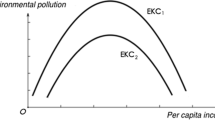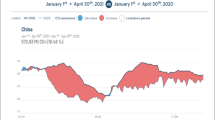Abstract
The balance between economic development and environmental governance has always been the focus of attention, and this has become a key issue facing in China. In recent years, the means of improving the environment through taxation are common, and it is more in line with China’s national conditions. Carbon tax and fuel tax are considered to be effective environmental supervision measures, and the implementation of this policy is bound to have a critical impact on the advance of economic level. However, the implementation effects of these two mechanisms may be different, and they may also have various effects on regional development. Therefore, based on the panel data of China’s 29 provinces from 2008 to 2018, we adopt the spatial autocorrelation method to explore the relationship between the economic levels of various areas. Then, establishing the panel spatial econometric model of economic growth and carbon tax, economic growth and fuel tax respectively to compare the implementation effects of the two tax policies. It turns out that there is a positive correlation between the economic growth of 29 provinces in China. And whether choosing to levy carbon tax or fuel tax, they all have their own advantages and disadvantages. Finally, according to the results of empirical analysis results, some relevant policy suggestions are put forward.



Similar content being viewed by others
Data availability
The author declares that the data found in support of this study are publicly available, and the data source is provided in the paper.
References
Allan G, Lecca P, McGregor P, Swales K (2014) The economic and environmental impact of a carbon tax for Scotland: a computable general equilibrium analysis. Ecol Econ 100:40–50
Austin D, Dinan T (2005) Clearing the air: The costs and consequences of higher CAFE standards and increased gasoline taxes. J Environ Econ Manag 50:582
Bertil H, Ann-Sofie K (2000) Environmental tax reform in a small open economy with structural unemployment. Int Tax Public Financ 7
Cao J, Dai H, Li S, Guo C, Ho M, Cai W, He J, Huang H, Li J, Liu Y, Qian H, Wang C, Wu L, Zhang X (2021) The general equilibrium impacts of carbon tax policy in China: A multi-model comparison. Energy Econ 99:105284
Chen S, He L (2019) Taxation and the environment–health–poverty trap: a policy experiment perspective. China World Econ 27:72–92
Deng X (2019) The impact of fuel tax on energy conservation in urban transportation. Region Govern:238–240
Floros N, Vlachou A (2004) Energy demand and energy-related CO2 emissions in Greek manufacturing: assessing the impact of a carbon tax. Energy Econ 27
Fu Y, Liang Q (2020) Impacts of taxing fuel on regional energy environment: a case of China. Chinese J Environmen Manage 12:84–94
Ghazouani A, Jebli MB, Shahzad U (2021) Impacts of environmental taxes and technologies on greenhouse gas emissions: contextual evidence from leading emitter European countries. Environ Sci Pollut R 28(18):22758–22767
Ghazouani A, Xia W, Jebli MB, Shahzad U (2020) Exploring the role of carbon taxation policies on CO2 emissions: contextual evidence from tax implementation and non-implementation European countries. Sustainability-Basel 12
Guo J, Zhou Y, Ali S, Shahzad U, Cui L (2021) Exploring the role of green innovation and investment in energy for environmental quality: an empirical appraisal from provincial data of China. J Environ Manag 292:112779
González R, Hosoda EB (2016) Environmental impact of aircraft emissions and aviation fuel tax in Japan. J Air Transp Manag 57:234–240
Goto N (1995) Macroeconomic and sectoral impacts of carbon taxation. Energy Econ 17:277–292
Huang J (2015) Analysis on the difference of the carbon tax policy on the regional economic effects. Master Thesis, Northwest Normal University. https://doi.org/10.7666/d.D783272
Jiang Y, Han S (2016) Analysis on the impact of supplier involvement on emission reduction under carbon tax system. Soft Sci 30:43–48
Jiang Z, Ouyang X (2017) Analyzing the distributional effects of fuel taxation in China. Energ Effic 10:1235–1251
Kamruzzaman MH, Mizunoya T (2020) Quantitative analysis of optimum corrective fuel tax for road vehicles in Bangladesh: achieving the greenhouse gas reduction goal. Asia-Pacific J Regional Sci 5(1):91–124
Lai M, Xiao H, Chen W, Zhu S (2008) The dynamic general equilibrium analysis and policy options for levying fuel taxes in different sectors. J World Econ:65–76
Li B, Wu S (2016) Effects of local and civil environmental regulation on green total factor productivity in China: a spatial Durbin econometric analysis. J Clean Prod 153
Li J, Tan Q, Bai J (2010) Spatial econometric analysis of regional innovation production in China: an empirical study based on static and dynamic spatial panel models. Manage World:43–55 +65
Liang Q, Yao Y, Zhao L, Wang C, Yang R, Wei Y (2014) Platform for China energy & environmental policy analysis: a general design and its application. Environ Model Softw 51:195–206
Lin B, Jia Z (2019) How does tax system on energy industries affect energy demand, CO 2 emissions, and economy in China? Energy Econ 84:104496
Lin B, Jia Z (2018) The energy, environmental and economic impacts of carbon tax rate and taxation industry: a CGE based study in China. Energy 159
Liu Y (2013) Re-understanding of fuel tax reform in China. Pionee with Sci Technol Mont 26:81–82
Lu J, Yang J, Shao H (2014) Human capital and environmental pollution in China: a quantile regression analysis based on panel data of 249 cities. Journal of International Trade, 118-125
Lv Z, Hao R, Ge Y (2012) An empirical study of environmental tax’s impact on economic growth: based on the panel data analysis of carbon dioxide tax in 12 developed countries. Zhejiang Soc Sci:13, 21 +155
Magazzino C, Mele M, Schneider N (2021a) A D2C algorithm on the natural gas consumption and economic growth: challenges faced by Germany and Japan. Energy 219:119586
Magazzino C, Mele M, Schneider N, Shahbaz M (2021b) Can biomass energy curtail environmental pollution?. A quantum model approach to Germany. J Environ Manag 287:112293
Muhammad FB, Benjiang MA, Shahbaz M, Shahzad U, Xuan VV (2021) Unveiling the heterogeneous impacts of environmental taxes on energy consumption and energy intensity: empirical evidence from OECD countries. Energy 226:120366
Mele M, Antonia RG, Morelli G, Magazzino C (2021) Nature and climate change effects on economic growth: an LSTM experiment on renewable energy resources. Enviro Sci Pollut R:1–8
Pang J, Zhou J, Fu S (2008) Application of CGE model to analyze the economic impact of fuel tax in China. Inquiry into Econ Issues:69–73
Rao C (2009) An analysis on the effects of fuel tax reform upon various industries in China finance and investment. Modern Finan Econ-J Tianjin Univ Finan Econ 29:24–30
Requate T (2004) Dynamic incentives by environmental policy instruments—a survey. Ecol Econ 54:175–195
Sobieralski JB, Hubbard SM (2020) The effect of jet fuel tax changes on air transport, employment, and the environment in the US. Sustainability-Basel12(8):3352
Sterner T (2006) Fuel taxes: an important instrument for climate policy. Energ Policy 35(6):3194–3202
Shahzad U (2020) Environmental taxes, energy consumption, and environmental quality: theoretical survey with policy implications. Environ Sci Pollut R 27:24848–24862
Shahzad U, Fareed Z, Shahzad F, Shahzad K (2021a) Investigating the nexus between economic complexity, energy consumption and ecological footprint for the United States: new insights from quantile methods. J Clean Prod 279:123806
Shahzad U, Radulescu M, Rahim S, Isik C, Yousaf Z, Stefan AI (2021b) Do environment-related policy instruments and technologies facilitate renewable energy generation? Exploring the contextual evidence from developed economies. Energies 14(3):690
Şahin A, Aycan H (2021) Does fuel tax decrease carbon dioxide emissions in Turkey? Evidence from an asymmetric nonlinear cointegration test and error correction model. Environ Sci Pollut R 28:1–8
Tan J, Xiao J, Zhou X (2018) Market equilibrium and welfare effects of a fuel tax in China: the impact of consumers’ response through driving patterns. J Environ Econ Manag 93:20–43
Tian L, Jin R (2012) Theoretical exploration of carbon emissions dynamic evolutionary system and evolutionary scenario analysis. Energy 40:376–386
Wang F, Li J, Chen J, Liu J, Wu C (2017) Population density, energy consumption and the development of green economy: empirical analysis based on provincial panel data. J Arid Land Resour Environ 31:6–12
Wu J, Ji Y, Sun X, Xu Y, Du Y (2020) Guidance Optimization of Travelers’ Travel Mode Choice Based on Fuel Tax Rate and Bus Departure Quantity in Two-Mode Transportation System. J Adv Transp 2020:10
Wang J, Tang P, He J (2013) Screening of influencing factors of China fuel tax pricing on interval estimation of AHP. J Wuhan Univ Techno (Transporta Sci Engin) 37:326–329
Wesseh PK, Lin B (2019) Environmental policy and ‘double dividend’ in a transitional economy. Energ Policy 134:110947
Wang Q, Hubacek K, Feng K, Wei Y, Liang Q (2016) Distributional effects of carbon taxation. Appl Energy 184:1123–1131
Wang Q, Liang Q (2015) Will a carbon tax hinder China’s efforts to improve its primary income distribution status? Mitig Adapt Strat Gl 20:1407–1436
Wei L, Zheng Q (2016) Impact of imposing carbon tax on regional economy in China. Taxa Econ:88–93
Wu L, Zhang F (2015) Fuel tax reform:environmental, economic and social impacts. China Popula, Resour Environ 25:508–510
Xiao H, Lai M (2009) A dynamic general equilibrium analysis of the fuel tax reform. J Quant Econ 26:53–59
Xu X, Xu X, He P (2016) Joint production and pricing decisions for multiple products with cap-and-trade and carbon tax regulations. J Clean Prod 112:4093–4106
Yuan C, Wang J, Jiao P (2011) CGE simulation of fuel oil tax impact on national economy and transportation. J Traffic Transporta Engin 11:100–105
Zhang H, Li P, Zheng H, Zhang Y (2020) Impact of carbon tax on enterprise operation and production strategy for low-carbon products in a co-opetition supply chain. J Clean Prod 287:125058
Zhang H, Zhang J, He Y (2019) Impact of carbon tax on coal mining industry in Shanxi Province and countermeasures. Coal Econ Res 39:47–54
Zhang J, Zhang W (2013) Will carbon tax yield employment double dividend for China? International Journal of Business and Social Research, 3(4), pp.124-131.
Zhao L, Zhang L, Xu L, Hu M (2016) Mechanism of human capital, industrial structure adjustment and green development efficiency. China Popula, Resour Environ 26:106–114
Zhai M, Huang G, Liu L, Guo Z, Su S (2021) Segmented carbon tax may significantly affect the regional and national economy and environment-a CGE-based analysis for Guangdong Province. Energy:231, 120958
Funding
This paper is supported by the National Natural Science Foundation of China (Grant No.71964022) and North China Electric Power University Central University Fund (Grant No.2014MS150).
Author information
Authors and Affiliations
Contributions
Yanmei Li: conceptualization, validation, resources, review and editing, supervision, data curation, funding acquisition, and project administration. Jiawei Song: methodology, software, validation, formal analysis, and writing—original draft preparation. All authors read and approved the final manuscript.
Corresponding author
Ethics declarations
Ethics approval and consent to participate
Not applicable.
Consent for publication
Not applicable.
Conflict of interest
The authors declare no competing interests.
Additional information
Responsible Editor: Nicholas Apergis
Publisher’s note
Springer Nature remains neutral with regard to jurisdictional claims in published maps and institutional affiliations.
Rights and permissions
About this article
Cite this article
Li, Y., Song, J. A comparative study of carbon tax and fuel tax based on panel spatial econometric model. Environ Sci Pollut Res 29, 15931–15945 (2022). https://doi.org/10.1007/s11356-021-16650-z
Received:
Accepted:
Published:
Issue Date:
DOI: https://doi.org/10.1007/s11356-021-16650-z




